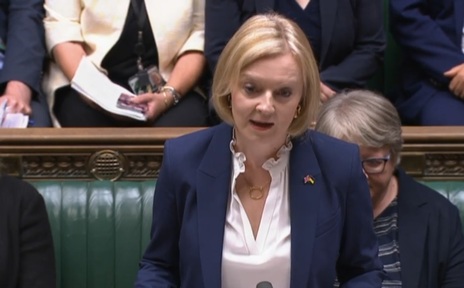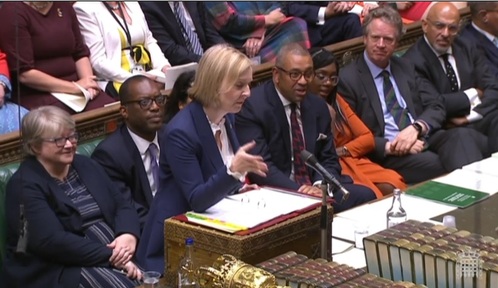Liz Truss confirms she'll scrap ring-fenced health and social care levy
Prime Minister Liz Truss said during her first PMQs clash with Labour leader Keir Starmer that she will be reversing the 1.25 per cent rise in National Insurance and is scrapping the Health and Social Care Levy.

During PMQs (Prime Minister's Questions) on September 7, Liz Truss spoke of plans to reverse the 1.25 per cent National Insurance rise to help people with the cost-of-living crisis.
Liz Truss told MPs: “We will reverse the National Insurance increase”.
Some £36bn of the care levy from the National Insurance rise was due to go to NHS and social care in three years. But only £5.3bn of that was earmarked for social care.
Health and social care investment to 'stay exactly the same'
On her first day, Thérèse Coffey, who is the country’s third health and social care secretary in two months, said spending on health and care will remain unchanged.
“Instead of having, in effect, a ring-fenced levy, we will be funding [health and social care changes] out of general taxation”, Thérèse Coffey told the BBC.
“The investment going to health and social care will stay exactly the same. It’s an important challenge we are facing and I’m looking forward to delivering that.”
Care chief: Risk of 'complete meltdown in services'
Care providers have called for money from the Health and Social Care levy to support care homes and home care providers and to see better pay for care staff to tackle the current staffing crisis.
Jane Townson, the chief executive of the Homecare Association, said: "We are concerned about the proposed removal of the National Insurance increase, as the Health and Social Care Levy was allocated to support the NHS and social care reform. The money will have to come from somewhere to avoid a complete meltdown in services, which are already in a parlous state.”

Martin Green, the chief executive of Care England, which represents care providers, has written to Liz Truss calling for the direction of ‘a greater share of the money generated through the Health and Social Care Levy towards the adult social care sector’.
During her Conservative leadership campaign, Liz Truss said she wanted to divert extra funding allocated to the NHS this year and raised through the national insurance rise to adult social care, in order to tackle delayed patient discharges from hospital. During her campaign, she pledged to reverse the rise in national insurance, suggesting the government would borrow the money to fund the increase.
Care providers' 683% rise in energy costs
On top of staffing shortages, the cost-of-living crisis has hit care providers hard, with research, conducted for Care England, revealing care homes are being charged £5,166 per bed to buy gas and electricity in October 2022. If care providers had forward purchased the same energy in August 2021 it would have cost £660 – that’s a 683 per cent rise.
Liz Truss has promised to address the energy crisis, as this week Care England demanded the introduction of a ‘per-bed energy price cap equivalent to the proposed domestic energy price cap or the reimbursement of providers for the increased energy costs incurred’.
Over 13,000 waiting to leave hospital
Ms Coffey’s predecessor, Steve Barclay, told the House of Commons on 5 September: “Delayed discharge means longer waits in A&E, lengthier ambulance handover times and the risk of patients deteriorating if they remain in hospital beds too long – particularly the frail elderly.
"The most recent figures, from the end of July, show that the number of these patients is just over 13,000 – similar numbers to the winter months."
Ms Coffey has announced her ‘ABCD’ priorities are to tackle issues around ambulances, backlogs, care and patient appointments for doctors and dentists.
Thérèse Coffey said on her first day as health secretary: “There are thousands of people in hospital who don’t need clinically to be in hospital that need care once they leave. This combination of focusing on social care and health is going to be critical.”
Around 1.6 million older people and working-age adults do not receive the care support they need.
The Homecare Association’s chief executive Jane Townson says real social care reform lies in a credible 10-year workforce strategy for social care, aligned with the NHS People Plan.
Coffey told £107m a year needed to cover 50% rise in home care workers' fuel costs
Jane Townson has written to both Thérèse Coffey and Liz Truss to ask for an increase in baseline funding for home care by at least £1.7bn a year to support recruitment and retention of care workers - by enabling payment of wages equivalent to NHS Band 3 Healthcare Assistants.
In a letter (dated 7 September) to Miss Coffey, the Homecare Association chief executive wrote: ‘In the past, you have signalled that social care must take priority for extra money to address a staffing shortfall of over 160,000. As the representative body for home care providers across the UK, we agree.’
She also warned in the letter: ‘It is paramount that the fair cost of care exercises being undertaken by local authority commissioners reflect the true amount needed to recruit, support, develop and retain a skilled, competent and compassionate workforce’.
The letter revealed that home care workers collectively drive an estimated four million miles a day to deliver care in people’s own homes. The chief executive has called for immediate emergency grant funding to help cover higher fuel costs incurred by home care workers.
‘Our calculations indicate that the home care sector needs an extra £107 million p.a. to cover the 50 per cent rise in fuel costs over the last year.’
With winter pressures expected to build in the country’s hospitals, Jane Townson has said: “We call on the Prime Minister to prioritise additional funding for home care to help build vital capacity for this winter and beyond."
Latest News
 29-Jul-24
Dementia Bus gives carehome.co.uk staff insight into life with dementia
29-Jul-24
Dementia Bus gives carehome.co.uk staff insight into life with dementia
 01-Mar-24
Find out the top care homes in 2024
01-Mar-24
Find out the top care homes in 2024
 21-Mar-23
UK's top care homes in 2023 revealed
21-Mar-23
UK's top care homes in 2023 revealed
 03-Jan-23
carehome.co.uk launches free care helpline
03-Jan-23
carehome.co.uk launches free care helpline
 13-Dec-22
5 mins with Emily Whitehurst, chief operating officer for Constantia Healthcare
13-Dec-22
5 mins with Emily Whitehurst, chief operating officer for Constantia Healthcare